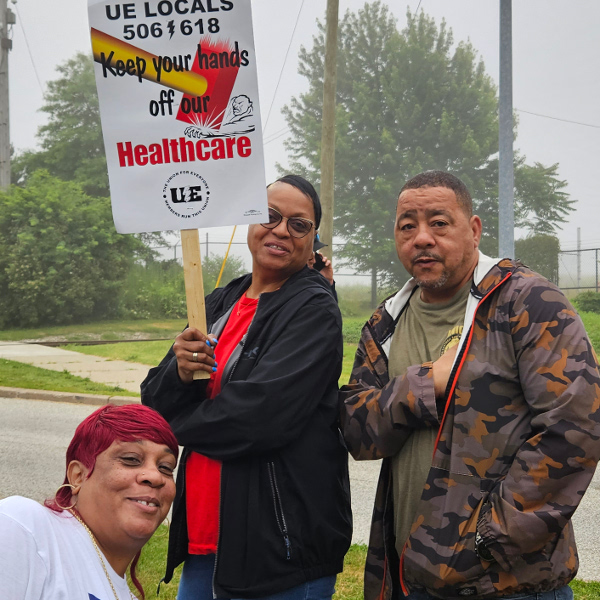After ten weeks of a hard-fought battle on seven different picket lines and at other locations in Erie and around the country, the 1,400 members of Locals 506 and 618 forced Wabtec to improve the contract offer that the members had overwhelmingly rejected on June 22. The UE members voted on August 31 to accept a tentative agreement that was reached between the parties the previous week, ending their strike.
“We are proud of the resolve of the membership over 70 days on the picket line,” said Local 506 President Scott Slawson. “As a result of the action taken by our members, we made both economic and non-economic gains.”
The locals surveyed their members after the strike began to see what were their top issues that they wanted to see improved in order to end the strike. The locals’ negotiating committee believed that ten weeks on the picket line had forced the company to give up everything that it was prepared to give up and that the committee had addressed members’ issues in the tentative agreement.
“I believe we got more in this contract than Wabtec ever wanted to give,” said Local 618 Business Agent Janet Gray. “That success is due to the 1400 members who stood strong, the relentless efforts of the officers and executive boards (including the National Officers and Staff assistance) and the overwhelming support from other unions and the community. We would not have succeeded without it.”
Tentative Agreement Improves Wages and Benefits, Improves Accountability

After weeks of fruitless negotiations where no one from the company showed up at the bargaining table, the members’ resolve finally forced the company to send in Niki Theophilus, Wabtec’s vice president for human resources, to bargain with the union negotiating committee.
Wabtec was forced to improve its wage offer by 36 percent since the start of the strike – unheard of during a long strike. “Legacy” employees’ wages will increase nearly 14 percent during the life of the four-year contract. The company agreed to General Wage Increases (GWIs) of 3.65, 3, 3.25 and 3 percent. The company also agreed to a $1,500 ratification bonus. This is the first time in more than two decades that the locals’ members will receive GWIs each year of a contract.
One of the locals’ key goals was to improve wages for workers on the ten-year “progression” they were forced to agree to in 2019 for new hires and workers who were on layoff and not working when Wabtec took over. While they were not able to decrease length of the progression, the company was forced to equalize the progression steps, which will result in a nearly 40 percent wage increase for workers on progression during the life of the contract. Depending on their classification, some employees on progression will see anywhere from a 43 to 54 percent wage increase. The company also agreed that if it has to raise the starting wage of any of the classifications, employees in that classification will have their wages increased by the same percentage.
The company also had to improve its medical benefits proposal by adding a premium cap of four percent and continuing the current HRA benefit for the first two years of the contract. The company also agreed to a Healthcare Review Committee made up of representatives of the locals and management to review the medical benefits once a year prior to open enrollment. The purpose of the committee is to hold down costs and improve the medical benefits.
Wabtec was also forced to add back a sixth week of vacation for members who qualify for it during the life of the contract. The company also agreed that it could not schedule employees’ vacation — a position the company had taken prior to the strike.

The company was unwilling to restore the union’s right to strike after exhausting the grievance process, but did agree to additional procedures for accountability for the grievance process, including quarterly and annual meetings with management at the corporate level to evaluate the grievance process and any grievance backlog with the ability to settle grievances. Wabtec also had to agree that if it lost an arbitration, the company would pay for all of the costs of the arbitration.
In its final offer, Wabtec gave the locals an additional right to strike if the company didn’t accept an arbitrator’s decision and appealed it to federal court. The company settled more than a dozen grievances and pending arbitrations, resulting in thousands of dollars of backpay and reinstatements, and agreed to withdraw its federal lawsuit against Local 506 over an arbitrator’s decision that the local had won.
Wabtec also agreed to rescind its threat to permanently subcontract 275 bargaining unit jobs that would have resulted in permanent layoffs. On June 9, the last day of the previous contract, the company handed the locals’ negotiating committee a letter threatening to permanently subcontract the 275 jobs unless the members ratified its last, best, and final contract proposal.
That last-minute threat backfired on the company on June 22 when the members overwhelmingly rejected the company offer, precipitating the strike.
The Strike Machinery
The locals had been preparing their members for a possible strike for more than a year. At monthly membership meetings, the locals would tell the members to prepare for a possible strike. A contract support committee was formed months before negotiations began, and the various strike support committees were formed months before the strike.

The Local 506 strike kitchen.
The union reached out to an Erie County-based healthcare provider to see what services would be available for their members, and Local 506 updated its kitchen to make sure it was in compliance with Erie County health codes. Port-a-johns, tents, coolers, and burn barrels were ready to roll out before the strike.
A mass text system was set up to communicate directly with the members, and Local 506 stewards’ system was converted to the strike support network with picket captains assigned to each of the plant’s seven gates.
After the company gave the union its last, best and final contract proposal on June 10, the members overwhelmingly voted it down at a membership meeting on June 22. Within a half an hour after the members voted down the company’s offer, the union’s strike machinery was rolled out. Tents were set up at the plant’s seven gates, members marched out of the plant on second shift, where they were joined by other members, and the strike was on.
An Epic Strike

The ten-week strike was the second strike by the locals’ members since Wabtec acquired the Erie locomotive facility from GE Transportation in 2019 — which resulted in a nine-day strike.
This epic strike was the second-longest strike in the locals’ history, longer than the 1946 strike against GE, and second only to the 102-day strike against GE in 1969.
However, unlike those two strikes, which involved over one hundred thousand different union members at GE plants across the country (200,000 UE members in 1946), this strike only involved the 1,400 UE members at one Wabtec plant. 1,400 UE members faced off against a Fortune 500 company with facilities employing 27,000 employees in 50 countries around the world.
Unlike the 2019 nine-day Wabtec strike, the company was prepared for this strike. An internal company memo the locals obtained after the strike began stated that the company had been preparing for a strike for over a year.
Outside security was in place from the start of the strike. Wabtec had hired the security firm AFIMAC Global which also provided more than 100 scabs. The scabs were housed in nearby hotels and bused into the plant by a bus company, Urban Express, based in Columbus, Ohio. In addition to the company’s Erie plant managers and engineers, the company also brought in managers from other Wabtec locations.
In an effort to encourage the locals’ members to cross the picket lines and scab, Wabtec had mailed letters to the members’ homes before the contract expired, advising the members of their “right” to cross the picket lines in the event of a strike. The mailing also included a resignation letter for the members to resign from the union.
Wabtec got an injunction six weeks into the strike and filed four Unfair Labor Practice charges (ULPs) against the locals. (After the strike, the company withdrew its ULP charges against the locals.)

Throughout the strike the 1,400 members were rock solid. Only a handful of members crossed the picket line — less than one half of one percent of the membership. The locals’ members maintained picketing 24/7 at the plant’s seven gates. In an effort to hold off an injunction, the union largely followed the terms of the 2019 injunction, limiting picketing at the plant gates and keeping the picket tents back from the driveways into the plant.
The locals spread the strike beyond the picket lines, targeting Erie-area businesses that were supporting Wabtec. Operating Engineers Local 66 lent the locals a 12-foot tall Scabby the Rat that made appearances at the businesses that were aiding Wabtec.
The locals also sent members to leaflet other Wabtec plants in Pennsylvania and Ohio. UE Eastern Regional President George Waksmunski, staff and members also leafleted Wabtec plants in Virginia and North Carolina. UE members and staff leafleted a Wabtec facility in Barstow, California.
Some of the highlights of the 10-week strike have already been published in the UE NEWS, including:
- The overwhelming community support the Union received throughout the strike.
- The support from other unions across Erie County and across the country and internationally.
- The support from elected officials, including all of the Erie County elected officials, state representatives and state senator; Pennsylvania Senators Bob Casey and John Fetterman; and Senator Bernie Sanders.
The locals are planning on taking out a full-page ad in the Erie Times-News, thanking the Erie community and all of their supporters.
“It would not have been possible for our local to survive the strike without all the generous supporters who contributed to our strike fund,” said Local 618 President Karleen Torrance. “I am immensely grateful for the support we received and I hope all the supporters realize how much we appreciate it.”
“There is strength in numbers”
While the strike is over, the fight against Wabtec will continue. The locals are still planning on pursuing the Green Locomotive Project — with or without the company’s support. And the locals plan to aggressively enforce their new four-year contract.
“Our 1,400 union members united for the common cause, proving there is strength in numbers,” said Local 506 Chief Plant Steward Leo Grzegorzewski. “UE Local 506 and 618 members went up against a Fortune 500 company and fought for a fair contract that we could live with for four years, and we achieved our goal. While we did not get everything we went out for, we gave up nothing! Four years of incremental raises, improved progression tables for new hires, and a $1,500 signing bonus are just a few of our wins. Stay united, stay strong!”
The locals’ negotiating committee consisted of Local 506 President Scott Slawson, Local 506 Business Agent John Miles, Local 506 Chief Plant Steward Leo Grzegorzewski, Local 506 Vice President/Recording Secretary Brian Welch, Local 618 President Karleen Torrance, Local 618 Business Agent Janet Gray, and Local 618 Financial Secretary Larry Bednaro. They were assisted by International Representative John Thompson, General President Carl Rosen, Director of Organization Mark Meinster, General Secretary Treasurer Andrew Dinkelaker, Research Director Karl Zimmerman, International Strategies Director Kari Thompson, Communications Director Jonathan Kissam, and Field Organizers Ben Wilson and Heather Hillenbrand.
